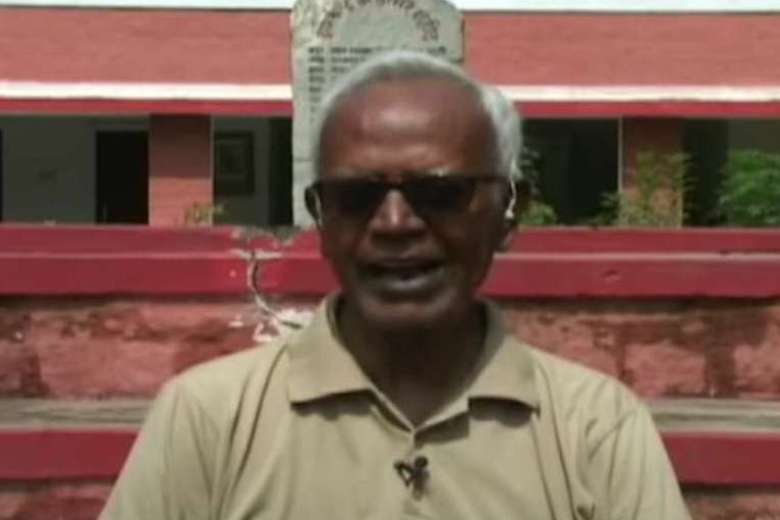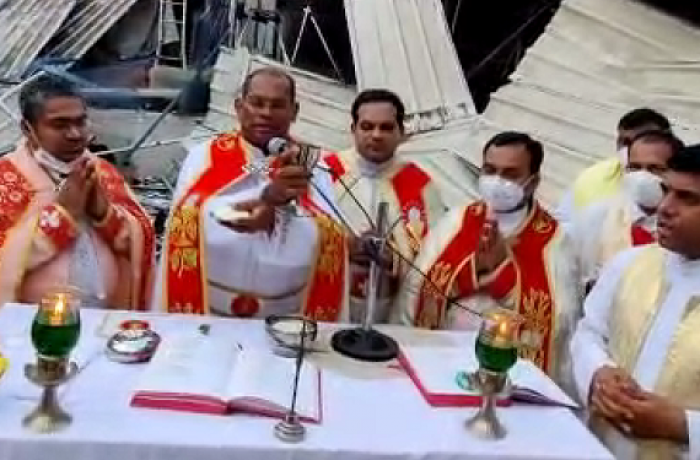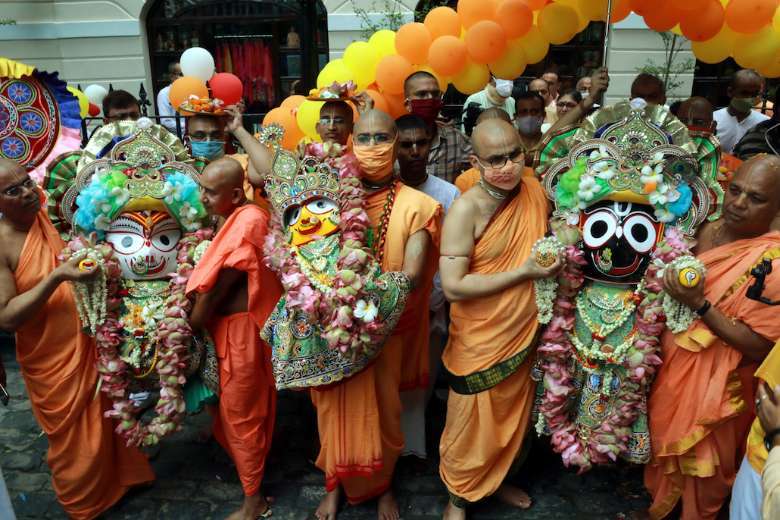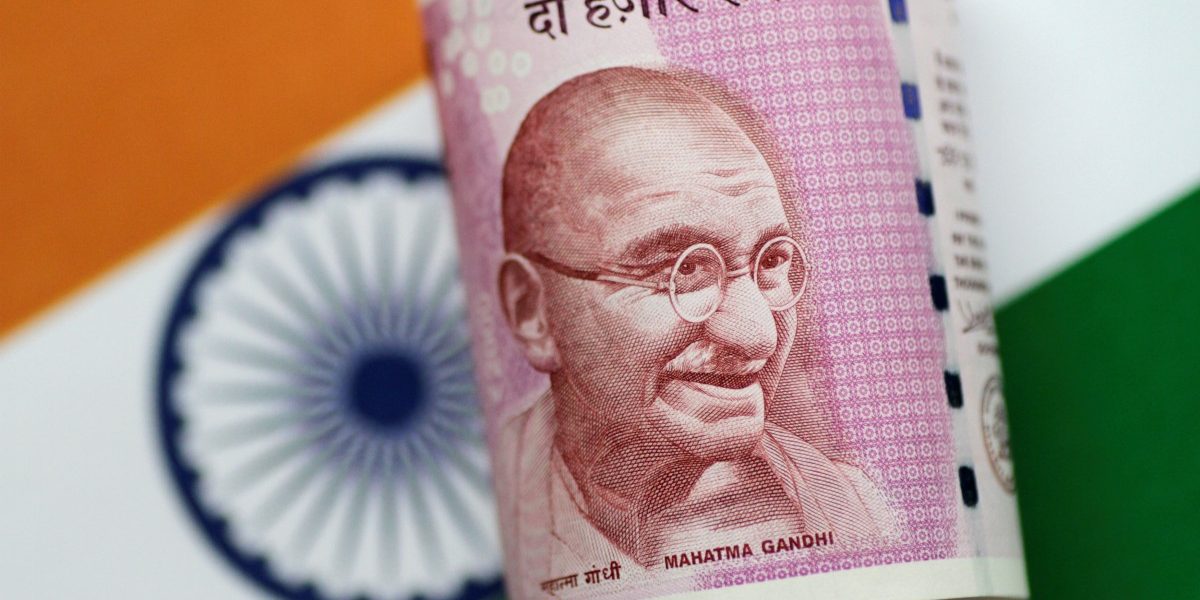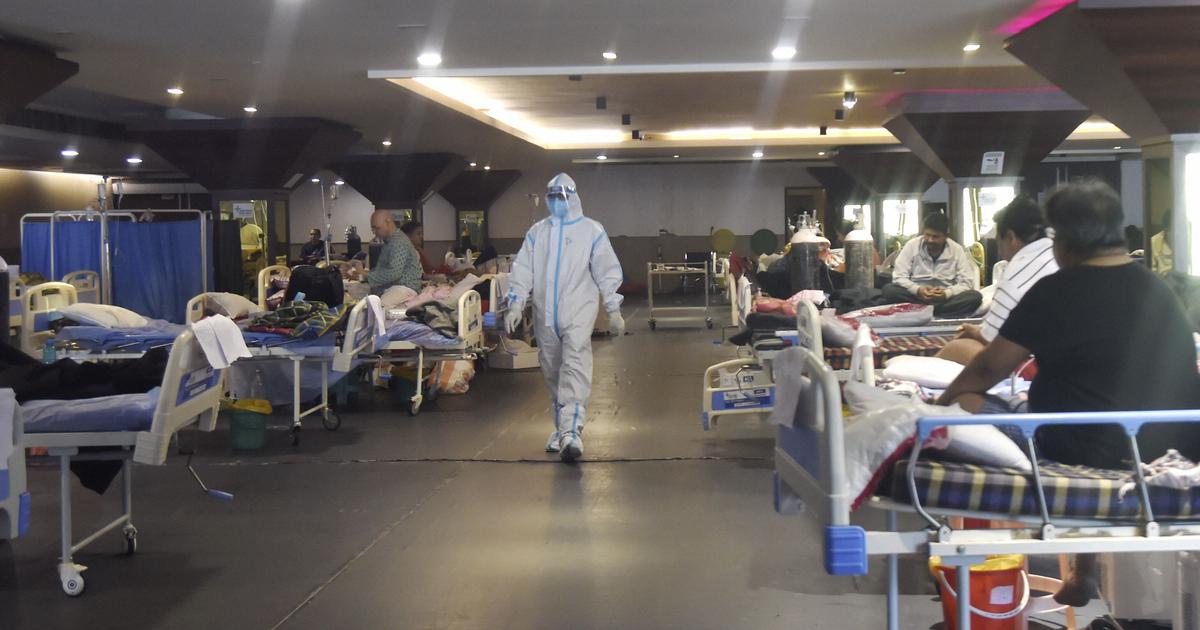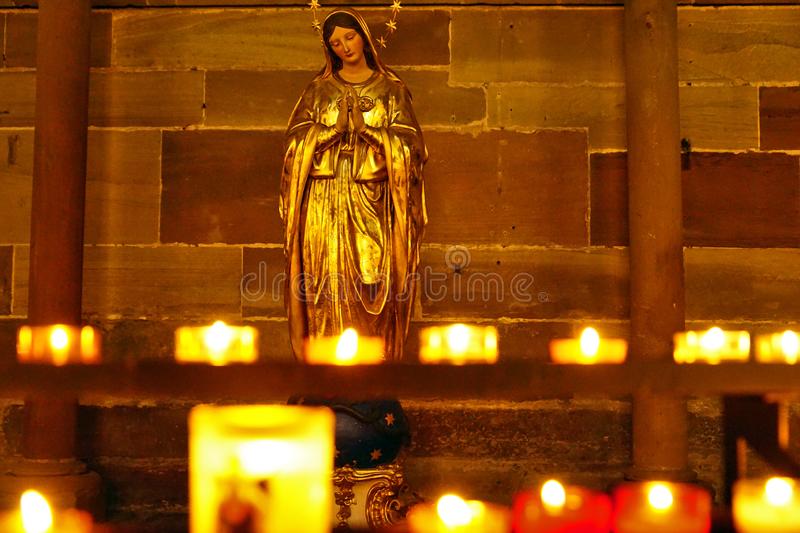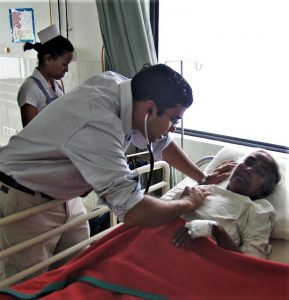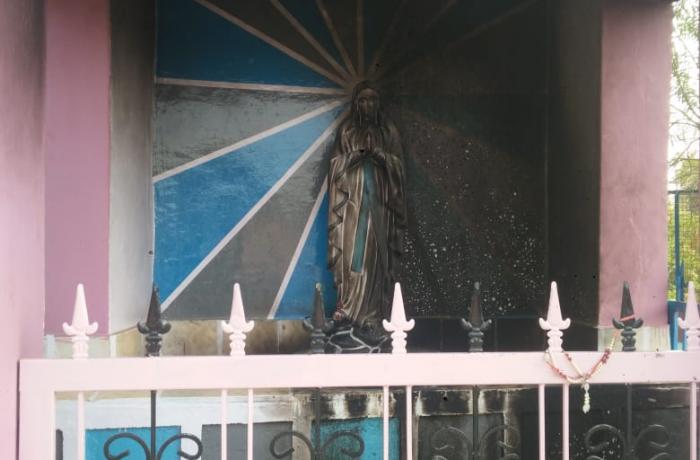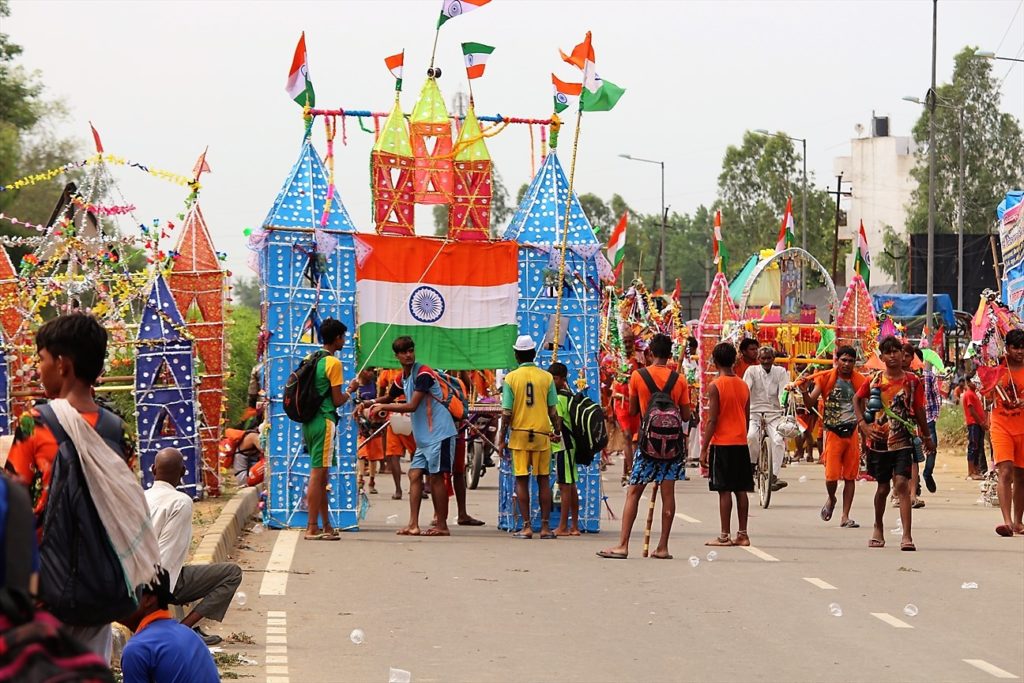Judges pay tribute to Indian Jesuit’s service
Bombay High Court commends the late priest's work for society while hearing his bail application posthumouslyBombay High Court has expressed “great respect” for the work done by Indian Jesuit priest Stan Swamy, who died in custody on July 5.The 84-year-old, who suffered from Parkinson’s disease, hearing impairment and other age-related ailments, never recovered from the hardships of being confined in a jail without basic services.Justice S.S. Shinde and Justice N.J. Jamadar of the top court in the western state of Maharashtra were hearing the late priest’s bail appeal posthumously on July 19“We don’t have time normally, but I saw the funeral service [of Father Swamy]. It was very gracious,” Justice Shinde said.“He is such a wonderful person. The kind of service he has rendered to the society. We have great respect for his work. Legally, whatever is there against him is a different matter.”The judges also tried to counter criticism of the judicial system and the National Investigation Agency (NIA), a federal anti-terror body that arrested Father Swamy, for repeatedly denying the priest’s bail applications on medical grounds. Read More
Delhi, Syro-Malabars pray amidst the rubble of a destroyed church (VIDEO)
The Syro-Malabar diocese of Faridabad has appealed to the Indian Prime Minister Narendra Modi to pave the way for the reconstruction of the Little Flower Church in New Delhi, which was demolished last July 12 because it was considered unauthorised despite the fact that it had been operating for almost 15 years."We call on you to intervene immediately," writes Bishop Kuriakose Bharanikulangara, "to rebuild and restore the damage caused to the faithful in this place of prayer, which they devastated without any respect". At the same time, the diocese has also approached the National Commission for Minorities on the issue, while - as the video shows - the community continues to gather to pray amidst the rubble.Kerala's local government chief Pinarayi Vijayanha also said he was shocked by the demolition. "Something like this should not have happened, we will see what can be done about it," he said. Meanwhile, in Delhi, there is a back-and-forth over who ordered the demolition. The Delhi Development Authority, a federal government body, denies responsibility.The eviction notice to the "illegal encroachers" was allegedly issued by the Block Development Officer of the South Delhi district, which is under the local government's tax office. The notice, dated
Religious conversion in India: More smoke than fire now?
THE AGE-OLD DEBATE ON CONVERSION CONTINUES WITH THE SAME PASSION, TONE AND ARGUMENT EVEN TODAY An upper-caste Hindu boy, Narayan Sesadri Parlikar, joined a school run by the Church of Scotland in Bombay way back in 1838. Five years later in 1843, he converted to become a Christian. The Bombay Courier, the leading English daily of the time, published a column-length story on Parlikar’s conversion, triggering a major upheaval among the city's upper-caste Hindu society. The day after his conversion, the outraged members of the Brahmin priestly caste to whom the boy belonged, passed a resolution censuring the event. “The missionaries of Christian faith … distribute books on their dharma (religion). In order to facilitate their efforts, they have established schools. For the sake of education, Hindu boys join their schools. The boys are immature in their understanding of Hindu dharma. Their minds become confused, and many have been converted to Christianity,” the resolution said. The 19th-century debate on religious conversion continues with the same passion, tone, and argument even today. The parties in the debate haven’t progressed much in understanding each other’s claims on the contentious issue of conversion that keeps surfacing in politics, media and courts. Those who want to outlaw conversion argue that
MHA Refuses to Reveal Why FCRA Was Amended, Even as Changes Impair NGOs’ COVID Aid Efforts
Even as non-government organisations (NGOs) face severe fund shortages due to changes in the Foreign Contribution Regulation Act (FCRA) effected by the Centre last year – which has adversely impacted their ability to reach out to the poor and marginalised in both rural and urban areas during the second wave of the coronavirus in India – the Centre has repeatedly thwarted attempts by Right to Information (RTI) activists to access details surrounding the reasons why the Act was amended.The Wire had last year reported that leading NGOs believed that changes to the FCRA would deal a crushing blow to the voluntary sector and impact its ability to collaborate and conduct research.They argued that the changes effected through the Foreign Contribution (Regulation) Amendment Bill, 2020 would severely impact collaborative research in critical fields in India as organisations receiving foreign funds will no longer be able to transfer them to smaller NGOs working at the grassroots level.They also said the Bill would initially impact the livelihoods of workers associated with these small NGOs and ultimately lead to the “killing” of the entire sector as caps on administrative expenses would make it impossible for even the bigger NGOs to perform. Read More
Coronavirus: India records 3,11,170 new cases, 4,077 deaths in a day.
The number of active cases stood at 36,18,458, while the recoveries climb to 2,07,95,335.India registered 3,11,170 new coronavirus cases on Sunday, pushing the country’s tally of infections since the pandemic began to 2,46,84,077. The toll rose by 4,077 to 2,70,284.Globally, the coronavirus has now infected 16.22 crore people and killed over 33.65 lakh since the pandemic broke out in December 2019, according to Johns Hopkins University.The national helpline number is 011-23978046, and the toll-free number is 1075. Read More
Hindu Extremists Pressure Convert to File False Charge against Pastor in India, Sources Say
A pastor is facing criminal charges in northern India even though the complainant later denied allegations against the church leader of luring him to convert, sources said. Police in Rupaidiha village, Uttar Pradesh state on Jan. 28 arrested 40-year-old pastor Dharmendra Singh on a charge of “alluring to convert” and two related charges – outraging religious feelings and promoting enmity. He was released on bail on Jan. 31. Pastor Singh denied all charges against him, saying members of the Hindu extremist Vishwa Hindu Parishad and Bajrang Dal fabricated a story and pressured a new Christian, Ramesh Gautam, to file a false complaint against him. Gautam said in court on Jan. 30 that the allegations were false, the pastor said. “He witnessed that his faith is his own choice and nobody has forced him or his family to believe in Jesus,” Pastor Singh told Morning Star News. “‘We have not converted by allurement but have become worshippers of Jesus,’ said Ramesh in the courtroom.” Pastor Singh leads a church in Nepalganj, Nepal, where he resides just across the India-Nepal border, but he regularly visits the Indian village of Rupaidiha, Bahraich District, to lead the new fellowship there where Gautam worships. Gautam and other members of his family put
Magazine asks India to derecognize Vatican
An Indian magazine has asked the federal government to derecognize the Vatican as a state for the Church’s alleged interference in the country’s politics. Church’s political interference should make Indian government sit up and formally take note, says an article swarajyamag.com published on February 4. The Indian government “must either issue a cease and desist demarche to the Vatican’s representative in Delhi, or derecognize the Vatican as a state altogether. No country is bound to recognize any religious organization as a state with sovereign rights in a secular world,” says the article. The magazine accuses the Church leaders of asking their people to vote against the National Democratic Alliance led by the pro-Hindu Bharatiya Janata Party (BJP). “They have thus pitched their tents fully in the opposition camp. This happened in December 2018, when a bunch of bishops, pastors and priests from many south Indian churches promised support to the Dravida Munnetra Kazhagam’s M K Stalin,” it says. “It is one thing for priests to articulate their own personal political preferences in private, quite another to misuse the pulpit to influence elections formally,” adds the article by Ragannathan, the magazine’s editorial director. While it justifies similar interference by various Indian religious leaders, it opposes the Church
Legal Struggle of Doctor Reflects Wider Harassment of Christians in India
Emergency medicine doctor Christo Thomas Philip was returning with his family to his native India from a medical conference in Greece when immigration officials at Delhi’s Indira Ghandi International Airport took him into custody. His deportation from India on that day, April 26, 2016, came after working for three years treating destitute people on the verge of death from snakebites, HIV, diphtheria, tuberculosis and heart failure, among other conditions, in Raxaul, a remote area of eastern India’s Bihar state. He was planning to return to his work there at the emergency care unit of Duncan Hospital. “My wife and children were allowed entry back into the country,” Philip, 36, told Morning Star News. “But as soon as my passport was scanned, I was surrounded by multiple Indian immigration officials, taken into custody and was informed that I had an hour to leave the country.” At age 10 Philip had migrated with his family to the United States, where he was educated. He had a life-time visa to India and an Overseas Citizen of India (OCI) card, but the immigration officials confiscated the card and his passport, telling him only that he was no longer welcome on orders of the Consulate General of India
Statue of Mary set on fire in Madhya Pradesh
The effigy is located in the parish of St. Joseph, a few kilometers from the archiepiscopal seat. The police open an investigation. For the bishop of Jhabua, not all hopes are lost: "More than 25 thousand people will participate in the feast of Our Lady of Lourdes". A statue of the Virgin Mary was set on fire in Madhya Pradesh, in the village of Ishgar, which falls under the diocese of Jhabua. This was reported by the Christian group Global Council of Indian Christians (GCIC). Its president Sajan K George says that the fire "took place on 3 February last. The statue of Mary was found burnt in the grotto of the parish of St. Joseph, about 10 km away from the archbishop's house". The Christian community, he adds, "is very disturbed and its religious sentiment is deeply wounded". Fr Rockey Shah, spokesman for the diocese of Jhabua, announced that a complaint had been registered. "Investigations are under way. We presented a memorandum to the police officer and the collector. We have asked our people to pray for peace and harmony and not to react aggressively ". According to Sajan K George, the burning is a deep wound for the local Church. " The vulnerable
‘Situation for India’s religious minorities is at tipping point’ – report
The report shows that since Narendra Modi’s Bharatiya Janata Party (BJP) came to power in 2014, the number of violent acts against India’s religious minorities have increased. (Photo: World Watch Monitor) A report by a religious freedom watchdog shows a dramatic increase in the number of attacks on Christians and Muslims in India in the last four years and “the situation … is at a tipping point”. The number of reported incidents in the first three months of 2018 was greater than the total number of attacks in the whole of the year 2014, according to the report “We’re Indians Too” by Open Doors. This year India entered for the first time the top 10 of the same organisation’s World Watch List, an index of the 50 countries where it is most difficult to live as a Christian. The report’s incident analysis shows that since Narendra Modi’s Bharatiya Janata Party (BJP) came to power in 2014, the number of violent acts against Christians, Muslims and tribal Dalits (members of the India’s lowest caste) have increased. Most incidents were reported in the Indian states of Chhattisgarh and Maharashtra, followed by Odisha, Madhya Pradesh, Uttar Pradesh, and Jharkhand. The report identifies four “drivers” of persecution: “Hindutva ideology, Anti-conversion laws, the misuse of PESA law [The Panchayatiraj Extension to Scheduled Areas Act, 1996]





